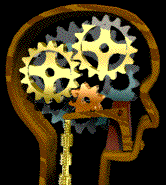What is Chiropractic Neurology?
Chiropractic neurology combines the best of the neurologic and chiropractic sciences.
 It is well accepted that chiropractic adjustments of the spine affect the function of the nervous system. With advanced measurable outcomes now available in neuroscience, research continues to explain the complexity of the nervous system and the effects of adjustments and other non-drug related therapies.
It is well accepted that chiropractic adjustments of the spine affect the function of the nervous system. With advanced measurable outcomes now available in neuroscience, research continues to explain the complexity of the nervous system and the effects of adjustments and other non-drug related therapies.
Throughout life the brain is constantly changing as a consequence of our experiences, physical activity, and environment. Most people develop one part of the brain more so than another. This is why some people are more artistic (right brain) than analytical (left brain) and visa versa. When the processing of neurological signals decreases to a critical level, brain asymmetry develops decreasing human potential leading to dysfunction and disease. Sometimes this faulty processing can cause internal dysfunction that you were not aware was a neurological problem associated with the brain and nervous system.
What does a Chiropractic Neurologist do?
Chiropractic neurologists are specialists in evaluating the function of the brain and nervous system. Once the deficit has been diagnosed, a treatment protocol is implemented to increase the function and potential of the brain and correct the brain asymmetry. It is the treatment that separates chiropractic neurology from medical neurology. While medical neurologists utilize synthetic drugs and invasive surgeries to affect the system, the chiropractic neurologist may utilize treatment involving specific nutrition and physical modalities that are non-invasive and non-surgical. Chiropractic adjustments of the spine and skeleton, cognitive exercises, visual and auditory stimulation, spinning and balance exercises, eye tracking exercises, and eye light therapy are just a few of the therapies utilized by the chiropractic neurologist to make changes to the nervous system.
Most people associate chiropractic with back and neck pain. However, the advances in brain research and imaging strongly support the specialty of chiropractic neurology. This advanced branch of chiropractic offers new hope for those who have not found relief from conventional treatment. On-going education and advanced training with the leading minds in neuroscience allows a Chiropractic Neurologist to assess and provide treatments for complex disorders involving the nervous system.
Who Is Chiropractic Neurology For?
Anyone suffering from the following may benefit:
- Vertigo, Dizziness & Balance Problems
- Movement Disorders, Tremors & Dystonia
- Visual Disturbances & Eye Fatigue
- Memory & Concentration Difficulties
- Peripheral Nerve Injuries
- Reflex Sympathetic Dystrophy (RSD)
- Learning & Attention Disorders ADD/ADHD/OCD
- Chronic Fatigue
- Fibromyalgia
- Irritable Bowel
- Depression
- Anxiety
- Tourettes
- Chronic Pain In The Neck/Back/Limbs
- Gastrointestinal Disorders
- High Blood Pressure
- Thyroid Disorders
- Weight Gain
- Sleeplessness
- Migraines & Headaches
- Scoliosis
- Hormonal Dysfunction
What Type of Testing is Performed?
Chiropractic neurology utilizes evaluations and treatments that are taught in both chiropractic and medical schools. These evaluations are purely scientific investigations into human physiology. These tests can be as simple as balance, co-ordination, and eye movements, to more complicated test involving particular areas of the brain. These may include vestibuloocular tests, optokinetic tests, pursuit and saccade testing, blind spot evaluation, radiography, postural analysis, vestibular and cerebellar testing. In addition, traditional clinical neurological examinations are used, including muscle testing, heart screening, reflexes, blood pressure, cranial and peripheral nerve testing, and sensory and motor evaluations.
